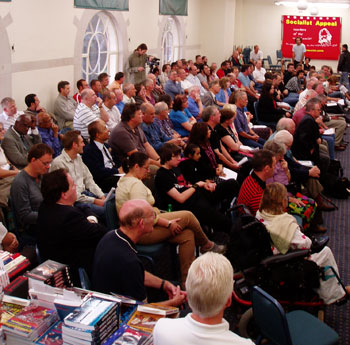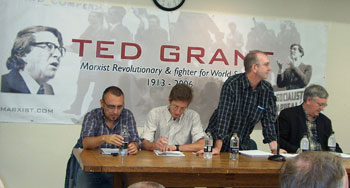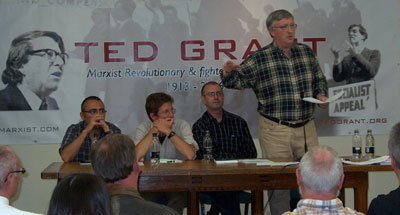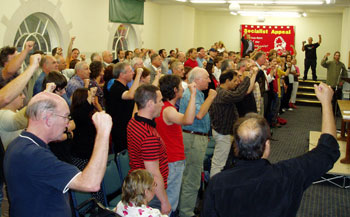 On Saturday September 9th a Memorial Meeting was held for Ted Grant in the Friends Meeting House in London. Around 200 people turned up for a lively meeting that included international guests, some video footage and contributions from the floor.
On Saturday September 9th a Memorial Meeting was held for Ted Grant in the Friends Meeting House in London. Around 200 people turned up for a lively meeting that included international guests, some video footage and contributions from the floor.
Rob Sewell opened the meeting and talked about Ted Grant's early years in South Africa. The South African Trotskyists eagerly awaited copies of the American Militant paper and started their work from a very young age. However, since there were more opportunities for revolutionary work in Europe, Isaac Blank went to Britain in 1934 and changed his name to Ted Grant.
Rob emphasised the enormous personal sacrifice Ted made. "Ted never retired; in fact, he never understood the word". Ted studied Marxism in a very serious way by reading the great teachers of Marxism, but he did more than that and actually developed these ideas, thus adding to the vast arsenal of Marxism. In the darkest days of the 1950s, he provided a beacon by tirelessly defending the basic ideas of Marxism. In that sense, Rob said, Ted was indeed an "unbroken thread" and continued the work of the Left Opposition. Just like the Trotskyists who had to fight against the stream for so long, he also gave everything to the revolution. The fact that Ted was never concerned with material things and dedicated his whole life to the cause is in itself a great inspiration for all comrades.
After introducing the meeting, the chair gave the room to the first of the international guests, Juan Ignacio Ramos, the General Secretary of El Militante in Spain. As one of the main leaders of the Spanish section of the International Marxist Tendency, Juan Ignacio delivered a fraternal salute from all workers and youth in Spain defending the ideas of Marxism.
He said it was impossible to describe the importance of the ideas of Ted on the vanguard in Spain that established the Marxist tendency El Militante in the 1970s. Ted's writings on the Spanish revolution in particular had a great impact on the Spanish Marxists because they brilliantly analysed the counterrevolutionary role of the Stalinists, the gravediggers of the revolution. His determination gave important results even during the Franco dictatorship, when the Marxists in Spain had to work underground. Thanks to his ideas and the work of comrades like Alan Woods, the Spanish section was established in the beginning of the 1970s and has now become a serious force in Spain.
 |
Juan Ignacio Ramos, Claudio Bellotti, Rob Sewell, Alan Woods |
"If there is one thing that we have learned from Ted, then it is that outside the mass organisations there is nothing". Juan Ignacio illustrated the point and described how the Communist Party, even after having played a dreadful role in the revolutionary events in the 1930s, during the struggle against the Franco dictatorship became a point of reference for the decisive section of the labour movement. After the fall of Stalinism, many opportunities opened to intervene amongst the ranks of the Communist Party and to win over honest activists and cadres. This, he said, stressed the need for flexible tactics and to avoid ultra-left adventures.
The correctness of these ideas is being proven not only in Spain but also in countries where an actual revolution is taking place, for example Venezuela. With the help of El Militante, the Corriente Marxista Revolucionaria in Venezuela was established, just as in Mexico an organisation was built that is now actively intervening in the class struggle.
He finished his contribution with the pledge to ensure that Ted's legacy is preserved for future generations. The plan is to translate all of Ted's works and to publish them as his collected works.
Rob Sewell then read out the first message to the meeting. It was a message from Esteban Volkov, Trotsky's grandson, who acknowledged Ted's dedication to the ideas of revolutionary Marxism. Other messages were read out during the meeting from the Sri Lankan and Pakistani comrades amongst others.
 The second speaker was another international guest. Claudio Bellotti is a leading member of FalceMartello, the Italian section of the International Marxist Tendency, and a member of the Executive Committee of the PRC. He opened his speech with a short poem by Bertolt Brecht about dedication. Ted Grant was an outstanding example of a fighter for life.
The second speaker was another international guest. Claudio Bellotti is a leading member of FalceMartello, the Italian section of the International Marxist Tendency, and a member of the Executive Committee of the PRC. He opened his speech with a short poem by Bertolt Brecht about dedication. Ted Grant was an outstanding example of a fighter for life.
Claudio recalled how Ted said in a meeting in Milan in 1992 how "once you are in this struggle, you are in this until your last breath". He said that Marxist theory does not drop from the skies but is capital built up generation upon generation. However, it is not just about theory, but also experience. The most important contribution of Ted was actually in the field of method. In meetings Ted always conveyed the idea that you always need to concentrate on the most important questions: attention to the mass movement, the economy, the actual class struggle.
The Italian comrades will publish a selection of Ted's writings in Italian and they will organise some day schools on Ted's works for younger comrades to acquaint themselves with his ideas.
The next speaker was Fred Weston, one of the editors of the In Defence of Marxism website. He said that sometimes there are black periods in history when it is extremely difficult to keep the forces together. Ted Grant lived through several of these but he never gave up. One of the most difficult periods was undoubtedly the 1950s, when the Fourth International after the death of Trotsky degenerated and made every possible mistake, for example with regards to the collapse of the Soviet Union, the development of the productive forces (which the Fourth denied could be developed any further, this during the post-war boom!), China, Yugoslavia, etc. "How could the official leaders get it so wrong, when Ted put it so clearly? Without Ted we would not be here." Fred finished his intervention saying that the world we live in does not allow you to sit quiet at home and that it is not enough to say how great a man Ted was. What is needed is for all of us to dedicate ourselves in the same way that Ted did.
The last speaker from the platform was Alan Woods, a close collaborator of Ted Grant for more than forty years. (Click here to hear his speech) He opened his speech with a joke: "Do you know what the biggest political party in Britain is? It is the party of ex-Militant members", referring to the sizeable amount of old comrades from the Militant days present at the meeting.
 |
| Alan Woods |
Alan went back more than 150 years, to the period when the Communist Manifesto was written. "This marvellous document", he said, "is more relevant than it ever has been. It really shows you how modern Marxist ideas are. It proves the colossal superiority of the Marxist method." These ideas are what motivated Ted Grant.
However, he said that Ted Grant cannot just be remembered in an anecdotal way and quoted Hegel who said that "no man is a hero to his valet". "We are not afraid to open the books. Of course we made this or that mistake, but show me one person who did not make any mistake in his life and I will tell you that that person never did anything."
Alan then went into the history of the tendency and said that we are in fact an old tendency that goes back a long way. He recalled the nightmare of the 1930s and 40s, making the point that "we complain too much". There was the rise of fascism, the crimes of Stalinism, Trotsky's son Leon Sedov was assassinated, but despite these big blows Trotsky never lost his faith. After the assassination of his son, Trotsky uttered the very tragic human words "I feel alone. I have nobody to talk to", which was in fact an implicit criticism of the then leadership of the Fourth International.
After Trotsky's assassination the leaders of the Fourth International proved not to be up to the tasks posed by history. In fact only one section really continued to apply Trotsky's method, the British section, the Revolutionary Communist Party. That is the actual unbroken thread to Trotsky.
Alan quoted a letter from Felix Morrow, one of the few leaders who were in opposition, who wrote: "Only the RCP can show a way out." and then mentioned Ted's main contribution to Marxism, The Marxist Theory of the State, which was a reply to Tony Cliff's flawed theory of state capitalism.
"You know, Ted sometimes said to me that he didn't know why Lenin and Trotsky wrote so many books. Nobody reads them and if they do they don't understand the ideas!" He illustrated this by pinpointing the main mistake of the Fourth International leadership after Trotsky's death, i.e. that they repeated like parrots the words of Trotsky without actually understanding his method and his dialectical analysis.
For example, before Mao Zedong came to power the official position of the then Fourth International was that Mao was going to capitulate to Chiang Kai-shek. Ted Grant, however, predicted well in advance that the Stalinists would come to power and would be compelled to nationalise the bulk of the industries and would thus create a state in the image of Moscow.
Ted was also able to foresee the Sino-Soviet split (see The Colonial Revolution and the Sino-Soviet Dispute) and showed that he had a much clearer conception of what was going on than the official leadership. Ted characterised these new regimes like China and Yugoslavia as a peculiar variant of Trotsky's theory of proletarian Bonapartism.
As for the general perspective after the war, it was clear that Trotsky's perspective of 1938 (that "not a stone" of the old organisations would be left and that the Fourth International would become the main focal point for workers) was being falsified by concrete events. This only goes to illustrate Napoleon's point that war is the most complex equation and thus the outcome is hard to predict. It was in fact necessary to revise Trotsky's position, which only the British RCP was prepared to do. Almost everybody denied the possibility of an economic recovery, which showed their real political level. Ted Grant wrote a much more sober approach to actual developments in his document Economic Perspectives 1946 and later on he developed this further in the document Will There be a Slump?, which is in fact the best explanation of the post-war boom.
In the second half of his speech, Alan explained that theory is very important, but it is only a tool. In fact the main contribution from Ted Grant was in the field of party building because of his emphasis of always orienting towards the masses and not to stand on the sidelines. "It is easy to build a new party by just bringing three men and a dog together and proclaiming yourself to be the new party. Sects like these always like to expose the labour leaders with shrill denunciations. The problem is that they know the real role of the labour leaders, and we know their role, but millions of workers don't understand this yet. It is foolish to approach politics from what ‘ought to be', which is a Kantian concept. Instead Marxists start from ‘what is' and start from the existing consciousness of the masses." Ted Grant, he said, developed this into an absolute law: "when the working class begins to move, they will inevitably express themselves through the existing organisations of the class". In British politics this means the dominance of the Labour Party has always been a significant question you cannot ignore. "Lenin and Trotsky always understood these elementary questions. The working class cannot express itself through these small organisations."
Then Alan talked about the period of the Militant Tendency and the context in which it grew to become the biggest and most successful Trotskyist organisation after the Left Opposition. He made the point that all the talk about the right-wing leadership of today is not new at all. In the past the very same happened; for example in 1969, when both the Labour Party and the unions were dominated by right-wing leaders like Lord Cooper. The sects laughed at the Militant, but "we had our last laugh when the class struggle swept through Britain in the 1970s and 1980s, when a shift to the left took place in the unions which allowed Militant to gain a real influence in the class." Unlike the other groups, the Militant Tendency shook the establishment to the core, with its 8,000 members and some 200 full-timers. All of this was achieved by applying the method of Ted Grant, who always stressed the need to follow Lenin's advice to "patiently explain".
However, because of the bureaucratic methods that emerged in the Militant leadership, all of this was thrown away with the "open turn", which at that time was only explained as a "small turn", to which Ted Grant correctly replied: "a turn over a cliff".
 |
| Singing of The Internationale |
Finally, Alan moved to the present situation and said that the working class in Britain has not started to move yet. The price for that has been creatures like Tony Blair and his New Labour. However, the tide is beginning to change. Fifteen years after the collapse of the Soviet Union and the so-called "end of socialism", capitalism stands condemned as a decrepit system that cannot bring society forward. Alan pointed to the "profound malaise" in society (Jacques Chirac's words) and said that the revolutionary developments in Latin America indicate the future of Europe. "There is a lot of political discontent but so far there has not been any political tool through which the working class can express itself." The beginning of the change can be seen in the unions, where there has been a lot of ferment and a shift to the left. Blair has not succeeded to break the unions away from Labour. New Labour are openly fighting each other now, which only illustrates the profound crisis they are in. "Now all that is needed is a movement of the class. When they move, they will move as they have always done and this inevitably will find an expression inside the Labour Party."
At the end of his speech, Alan Woods appealed to the youth to study Ted Grant's writings, saying that theory is not arid, it is a life plan. He also appealed to the various veterans in the room and reminded them about what convinced them to join so many years ago. The purpose of this meeting, Alan said, is not to talk about the old days and to be sad that Ted has passed away. "This meeting is meant to prepare for the future, and you cannot escape from politics." He finished his speech with a passionate appeal to everybody in the room, both the younger and the older comrades, to join Socialist Appeal and the International Marxist Tendency because "without organisation there is no future. The purpose of this is to rededicate ourselves to the only struggle that is worth fighting, the struggle for socialism".
Jim Brookshaw, a veteran comrade, organised the collection for the publication of Ted Grant's works, and a fantastic £4,500 was raised. After the screening of a short video clip of Ted Grant's last speech to a gathering of the International Marxist Tendency in 2003 there was room for contributions from the floor. Comrades from Germany, Spain and Britain addressed the meeting and made both strong political and more anecdotal points about Ted Grant. Clearly this was a very successful meeting that showed the important legacy Ted Grant has left behind.
Many of the comrades attending expressed an interest in staying in contact with the Socialist Appeal and entering into discussions. We sincerely hope these comrades will take on board the main message: if you want to really build a memorial to Ted then rejoin the movement. Come back and help us build a Marxist tendency within the British labour movement. Individually we are nothing. Together we can make a real impact on the future developments in Britain and the world.
See also: